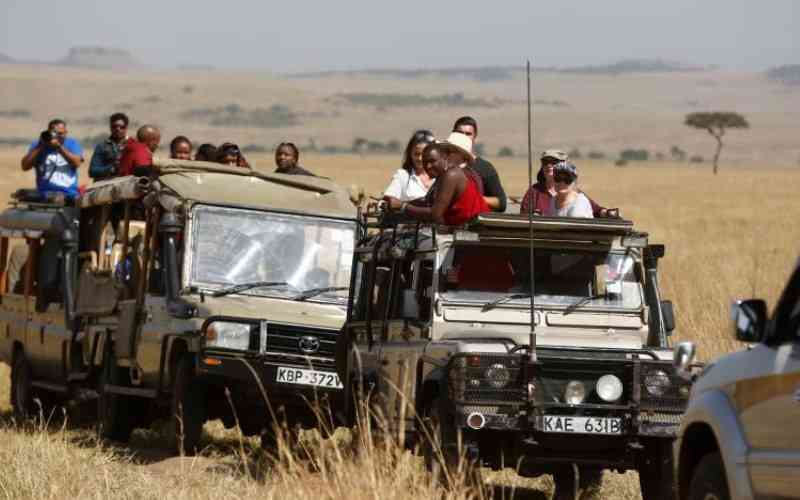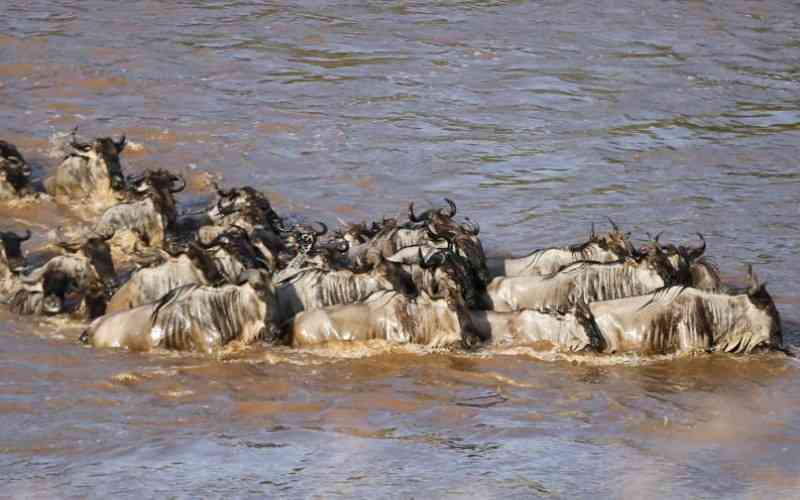
It is that time of the year for the Masai Mara wonder, the wildebeest migration. On the banks of the Mara River, close to two million of these ungulates are currently making the historic crossing.
As they cross, they will be met with dozens of off-road vehicles with tourists-both local and international-craning their necks to capture the phenomenon, having paid top dollar to be here.
At a time there have been concerns about crowding in the Mara, stakeholders are looking for ways to tame this.
This week, pictures of a lone and 'confused' cheetah surrounded by dozens of vehicles, described by some as "worse than Nairobi rush-hour traffic" circulated online.
Things are on the mend though, as conservationists devise ways to tame the wayward behaviour in the world-renowned sanctuary.
Jonathan and Angela Scott, avid photographers and filmmakers, are addressing the disconnect through their Sacred Nature Initiative founded in 2021.
The initiative supports the Narok County government's One-Mara Brand initiative and intends to inspire, educate and conserve the Mara.
"It takes an ecosystem approach in partnership with stakeholders, such as the Maasai Mara Wildlife Conservancy Association, to help safeguard the welfare of local communities and wellbeing of protected areas, while developing sustainable and attractive tourism products," said Scott during the initiative's unveiling in Nairobi this week.
Among the highlights of the initiative are the "20 commandments" forming the 'Safari Etiquette' to guide all players in Masai Mara and ward off cases of indiscipline. We look at some of the proposals.
Responsibility of camps and lodges: Camps and lodges will provide guests with a comprehensive briefing before setting out on their first game drive. It is easier to remind visitors to be quiet and respectful when they see their first lion when overwhelmed with excitement and emotion if they have been briefed before departing from camp.
Your driver or guide is in charge: Listen to what they have to say. If you feel they are driving too fast or too close to the animals, politely let them know your feelings.
River crossings: Do not get out of the vehicle at river crossing sites when wildebeest and zebras are crossing. These are life or death moments for the migratory animals. You may inadvertently cause them to stop crossing and panic. Don't do anything that might disturb predators that stake out these river crossing sites to ambush the herds. This is how they get a meal.
Combatting fraud: Narok county loses millions of dollars annually due to fraud. Guests should ask for and carry a valid entrance ticket irrespective of whether the cost is included in the safari and paid for by the tour company, lodge or safari guide.
Do not sit or stand on the roof of the safari vehicle: Sitting or standing on the roof exposes you to wildlife. This is more likely to make them nervous. And you could fall off if the driver moves or stops suddenly.
Keep quiet when approaching a sighting: If there are other vehicles present, be courteous and considerate. Try to share the experience by letting others enjoy a good view too. Ask your guide politely not to use their phone or radio while at a sighting.
Do not encircle wildlife: Doing so may block their chosen entry and exit route. Do not to drive opposite to another vehicle, potentially positioning yourselves in their shot or photograph. Promote good manners and friendly encounters.
Watching a mother with young ones: Be careful of the way she is responding to your presence. If she looks nervous or wants to move, it is time to back off or leave altogether.
Give a moving predator space: Do do not block the track with your vehicle, forcing it to detour. And rather than driving directly behind a predator, choose a track that loops around.
Do not move too soon when a predator is hunting: Starting the vehicle may startle the prey animal causing it to look up, alerting it to the hunter. Pick up your binoculars and enjoy the thrill of what nature intended.
If watching a mother with cubs at a den, stay back: Accept that there are times when you just cannot get into the right position to take a photograph. No image is worth causing distress to a vulnerable animal. Savour just being on safari without a camera pressed to your face.
Close off big cat dens until cubs are large enough: There have been incidents where small cubs have been run over by vehicles or the mother forced to move from a secure den site due to close approach by safari vehicles. This is a form of harassment.
Minimise stress on wildlife: Only if the protocols outlined here are respected by guides and visitors and enforced by management.
Cheetahs raise fewer cubs in Masai Mara: Research conducted by the Kenya Wildlife Trust's Mara Cheetah project found that females in areas with a lot of tourists raised one cub or less per litter to independence, compared to two or more cubs in low tourist areas. It is essential that driver and guides minimise their impact on cheetahs.
Big cats and vehicles: There was a time when allowing a cheetah to jump up on to vehicles was considered acceptable. It isn't, though the part Big Cat Diary allowed people to think it was.
Avoid creating new tracks in thickets: All big cats - and other animals - rely on the cover of thickets for shade and den sites. These are safe places for animals seeking peace and quiet - and sanctuary.
Respect protected area rules and regulations: Wild animals have a priority in protected areas. Once guides and visitors are made aware that breach of the regulations is taken seriously by relevant authorities, indiscipline can be stopped.
Bronze certification for drivers and guides: This should be the minimum requirement for guiding visitors in the Greater Mara Ecosystem. Guide qualifications, being non-compulsory and unmonitored, is the single biggest problem facing Kenya's tourism industry.
Use of customised 4x4 vehicles with low angle facilities: A vehicle with a half-door that can be lowered, allowing guests to lie on the floor in full view of the animals defeats the basis on which safari vehicles can approach wildlife by masking the human form to some degree.
Off-road permits for stills photography: This practice promotes disharmony among other visitors, can be subject to abuse and likely to exacerbate bad behaviour.

 The Standard Group Plc is a multi-media organization with investments in media
platforms spanning newspaper print
operations, television, radio broadcasting, digital and online services. The
Standard Group is recognized as a
leading multi-media house in Kenya with a key influence in matters of national and
international interest.
The Standard Group Plc is a multi-media organization with investments in media
platforms spanning newspaper print
operations, television, radio broadcasting, digital and online services. The
Standard Group is recognized as a
leading multi-media house in Kenya with a key influence in matters of national and
international interest.
